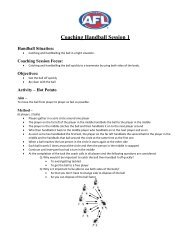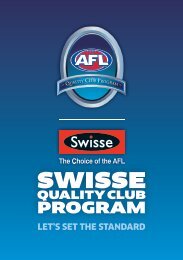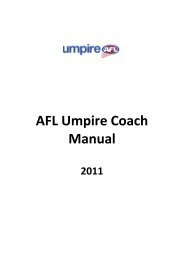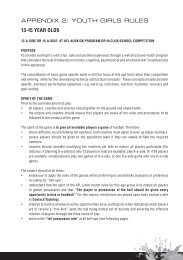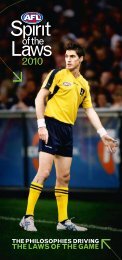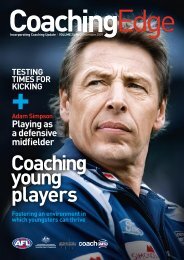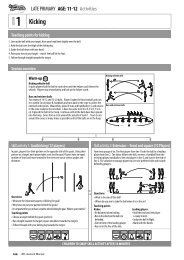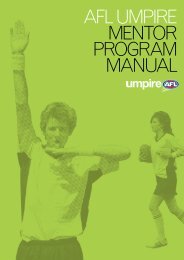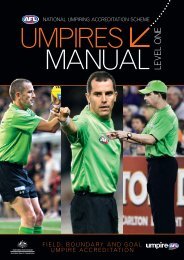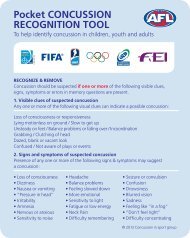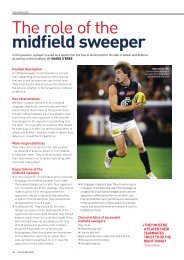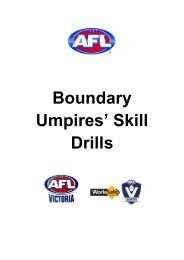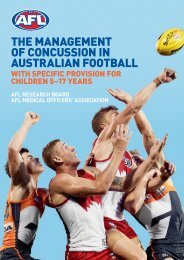2012 Youth Coaching Manual - AFL Community
2012 Youth Coaching Manual - AFL Community
2012 Youth Coaching Manual - AFL Community
Create successful ePaper yourself
Turn your PDF publications into a flip-book with our unique Google optimized e-Paper software.
Football clubs and alcohol use<br />
Playing and watching sport is a traditional Australian activity. So, too, is drinking alcohol. In many sports, like Australian<br />
Football, the two traditions come together in a formidable partnership. Football clubs can be locations of hazardous drinking,<br />
particularly by younger people, with an array of personal, social and civil problems. Sports clubs, therefore, constitute an<br />
important, if challenging, site for interventions to reduce alcohol-related harms. Subsequently, coaches and other team staff<br />
can play an important role and make an important contribution in reducing alcohol consumption and use within clubs.<br />
Strategies for coaches<br />
To prevent players misusing social drugs, coaches should:<br />
• Make players aware that the abuse of any substance is likely to injure their health and reduce their performance, and that<br />
drug abuse is simply incompatible with sport.<br />
• Ensure that players are aware of the facts on alcohol and social drug misuse.<br />
• Set guidelines and ensure a total commitment by all to these guidelines.<br />
• Establish alternative methods of celebrating, or control celebrations with strategies such as meeting all post-match<br />
commitments before celebrating, organising a meal with the celebrations, or involving parents.<br />
• Be available to discuss issues with players and know where to get help.<br />
Performance enhancing drugs – the coach’s role<br />
Drugs in sport are now a significant issue at all levels of sport. It is important that all coaches are prepared to deal with this<br />
issue and have developed their own philosophy and strategies to address it appropriately.<br />
The impact coaches have on players places them in a position to play a significant role with regard to drugs in sport. An<br />
effective coach can prevent drug misuse by players and help them deal with other issues related to drugs in sport. Coaches<br />
can influence the attitudes of players and should support and care for them as individuals.<br />
There are actions a coach can take to minimise drug misuse, including:<br />
• Communicating beliefs about health and fair play to players by reinforcing that the use of banned substances is cheating.<br />
• Discouraging practises such as smoking, drinking and the over-use of anti-inflammatories.<br />
• Encouraging players to abide by the <strong>AFL</strong> Drug Policy.<br />
• Providing players with factual information about banned drugs.<br />
• Being good role models.<br />
• Alleviating pressures on players where possible.<br />
• Helping players to develop skills such as decision making and assertiveness.<br />
BULLYING AND VILIFICATION<br />
Bullying is a form of deliberate aggressive and hurtful behaviour. Most bullying and victimisation is founded on an abuse<br />
of power and a desire to intimidate. It can be carried out against a victim by an individual or by a group. It is often an<br />
expression of prejudice based on issues such as race, culture, religion, sexual preference or perceived sexual preference.<br />
There are many forms of bullying:<br />
• Physical – e.g. hitting, kicking, taking and damaging belongings.<br />
• Verbal – e.g name-calling, insulting, repeated teasing and taunting, religious, racist or homophobic remarks.<br />
• Indirect – e.g. spreading rumours, excluding someone from groups, etc.<br />
The <strong>AFL</strong> has clear guidelines and policies on racial and religious vilification (<strong>AFL</strong> Rule 30) which provide a strong message<br />
that vilification on these (or indeed any other) grounds is not acceptable on the field (see <strong>AFL</strong> info sheets. Racial and<br />
religious vilification at afl.com.au). These principles should carry over to all parts of the youth football environment including<br />
training, social and other activities and apply to all persons participating in that environment.<br />
It is important that young players feel safe in football clubs and the wider football environment. Clubs and coaches should<br />
develop clear policies on bullying and vilification and methods of dealing with them appropriately.<br />
166 <strong>AFL</strong> <strong>Youth</strong> <strong>Coaching</strong> <strong>Manual</strong>



